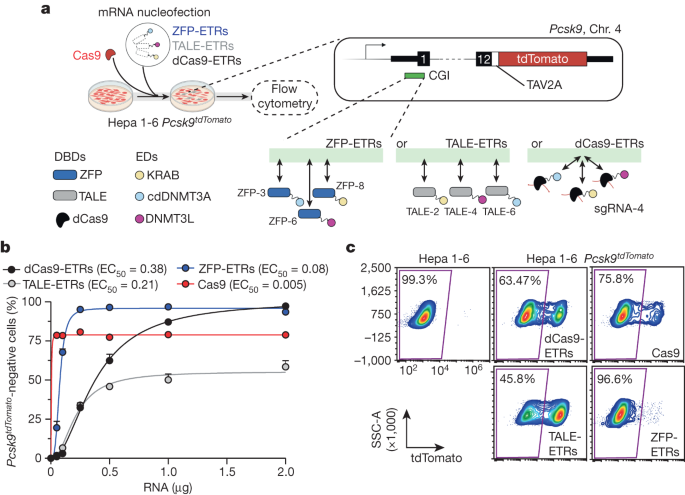Achieving Long-lasting Gene Silencing through Epigenome Editing
Centrala begrepp
The author demonstrates the effectiveness of hit-and-run epigenome editing in achieving durable gene silencing in vivo, showcasing its potential for therapeutic applications.
Sammanfattning
Permanent epigenetic silencing through programmable editors shows promise for disease treatment. Zinc-finger proteins were found to efficiently silence mouse Pcsk9, reducing PCSK9 levels for almost a year in mice. The study introduces an evolved engineered transcriptional repressor (EvoETR) design that effectively reduces PCSK9 levels without DNA breaks, paving the way for in vivo therapeutics based on epigenetic silencing.
Durable and efficient gene silencing in vivo by hit-and-run epigenome editing - Nature
Statistik
A single administration of lipid nanoparticles loaded with editors’ mRNAs halved circulating PCSK9 levels for nearly one year in mice.
The EvoETR design reduced PCSK9 levels in mice with efficiency comparable to conventional gene editing but without causing DNA breaks.
Citat
"Our study lays the foundation for the development of in vivo therapeutics that are based on epigenetic silencing."
Viktiga insikter från
by Martino Alfr... på www.nature.com 02-28-2024
https://www.nature.com/articles/s41586-024-07087-8
Djupare frågor
How can hit-and-run epigenome editing be optimized further for enhanced gene silencing efficiency
To optimize hit-and-run epigenome editing for enhanced gene silencing efficiency, several strategies can be employed. Firstly, further refinement of the editor design, such as utilizing advanced DNA-binding platforms like CRISPR/Cas9 or TALENs in combination with transcriptional repressors, could improve targeting specificity and efficacy. Additionally, optimizing delivery methods to ensure efficient uptake and sustained expression of the editors in target cells is crucial. This could involve exploring novel delivery vehicles or techniques that enhance cellular uptake and minimize off-target effects. Moreover, fine-tuning the temporal regulation of editor expression to achieve prolonged but controlled silencing without causing adverse effects on normal cellular functions is essential. Continuous monitoring and optimization of these parameters through preclinical studies will be key in maximizing the gene silencing efficiency of hit-and-run epigenome editing.
What ethical considerations should be taken into account when using epigenetic silencing as a therapeutic approach
When using epigenetic silencing as a therapeutic approach, several ethical considerations must be carefully considered. One major concern is the potential for unintended consequences due to off-target effects or long-term alterations in gene expression patterns beyond the intended target gene. Ensuring thorough preclinical testing and rigorous safety assessments are imperative to mitigate any unforeseen risks associated with epigenetic modifications. Transparency regarding the nature of treatment, its potential outcomes, and any uncertainties surrounding long-term implications should also be prioritized when obtaining informed consent from patients participating in clinical trials involving epigenetic therapies.
Furthermore, issues related to equity in access to these innovative treatments need attention to prevent disparities based on socioeconomic factors or geographical location. Ethical guidelines should be established to govern the responsible use of epigenetic therapies while safeguarding patient autonomy, privacy rights, and data protection throughout treatment processes.
How might long-term epigenetic modifications impact future generations
Long-term epigenetic modifications resulting from therapies like hit-and-run epigenome editing may have implications for future generations due to their potential heritability across germline cells. While this inheritability aspect offers opportunities for passing down beneficial changes acquired during treatment interventions (such as disease resistance), it also raises concerns about transmitting unintended genetic alterations or unknown risks associated with modified genes.
The intergenerational impact of persistent epigenetic changes underscores the importance of conducting comprehensive risk assessments before implementing such therapies clinically. Longitudinal studies tracking individuals who have undergone epigenetic modifications are necessary not only to evaluate their own health outcomes over time but also to assess any transgenerational effects that might manifest in offspring.
Ethical frameworks governing research involving heritable genome modifications should prioritize principles like beneficence (maximizing benefits while minimizing harms), non-maleficence (avoiding harm), justice (fair distribution of benefits and burdens), respect for autonomy (upholding individual decision-making), and transparency throughout all stages—from research design through implementation—to address concerns related to long-term impacts on future generations effectively.
0
